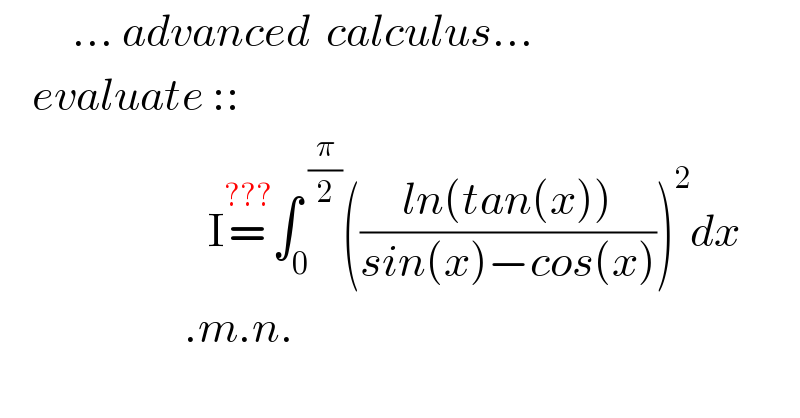
Question and Answers Forum
Question Number 121869 by mnjuly1970 last updated on 12/Nov/20

Answered by mindispower last updated on 12/Nov/20

Commented by mnjuly1970 last updated on 13/Nov/20

Answered by mindispower last updated on 13/Nov/20
![(sin(x)−cos(x))^2 =(((tg(x)−1)^2 )/(1+tg^2 (x))) I=∫_0 ^(π/2) ((ln^2 (tg(x)))/((tg(x)−1)^2 ))dtg(x) tg(x)=t⇒I=∫_0 ^∞ ((ln^2 (r))/((r−1)^2 ))dr =∫_0 ^1 (((ln^2 (r))/((r−1)^2 )).dr+((ln^2 ((1/r)))/(((1/r)−1)^2 )).(dr/r^2 )) ∫_0 ^1 ((ln^2 (r)dr)/((r−1)^2 ))..IBP⇒ lim_(t→0) [((−ln^2 (r))/(r−1))]_t ^1 +2∫_t ^1 ((ln(r))/(r(r−1)))dr =lim_(t→0) ((ln^2 (t))/(t−1))+2∫_t ^1 ((ln(r))/(r−1))dr−2∫_t ^1 ((ln(r))/r)dr =lim_(t→0) ((ln^2 (t))/(t−1))−2∫_0 ^(1−t) ((ln(1−r))/r)dr+ln^2 (t) =lim_(t→0) [(((ln^2 (t))/(t−1))+ln^2 (t))+2Li_2 (1−t)] =lim_(t→0) [((tln^2 (t))/(t−1))]+2Li_2 (1) cause Li_2 is continus =2Li_2 (1)=2.(π^2 /6)=(π^2 /3)](Q121976.png)
Commented by mnjuly1970 last updated on 13/Nov/20

Commented by mindispower last updated on 13/Nov/20

